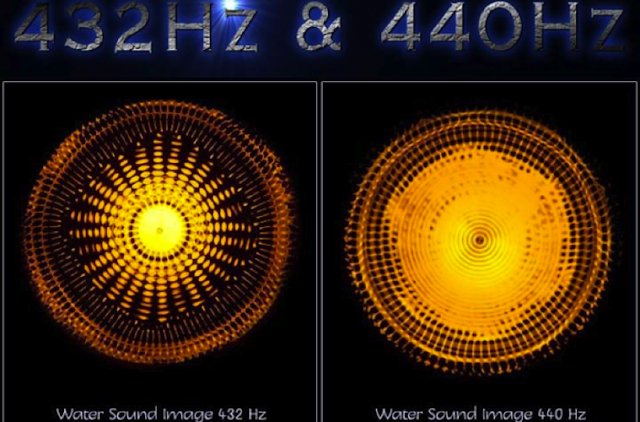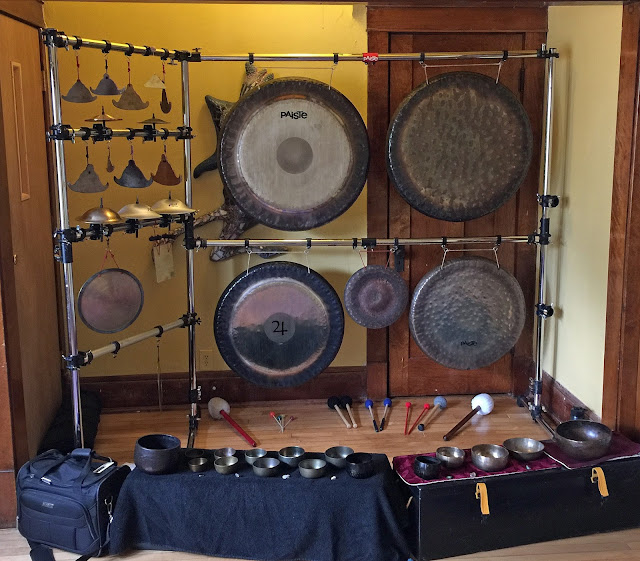The Fluidity of Time & Space - 2
Time. How do we actively work with it, mold it, change it, and change our perception of it?
Self Perception of Time
We live in a modern culture that is based on time. Clocks, computers, and other machine dissect our world into tiny increments of perceived space/time. Our lives are directly tied into this clock time. Everything we do is directed by clock time in some form. Let's look at a type of time perception and how to change it.
We all are intimately bound to music in our lives. The beat often drives us in our daily work, or daily activities. As a drummer, I'm extremely aware of how time works and how it is used in our modern music. Let's look at some basic exercises to establish a sense of time, and then move away from it.
Counting
This is a bit esoteric, and there's no need to be exact in your counting. As you move your notes further apart it becomes difficult to keep track of the time in-between them. This is OK.
This is one continuous exercise. Pick a fairly fast tempo/pace and count to 4 over and over, playing each count on a Gong, Bowl, or Bell:
12341234123412341234123412341234123412341234123412341234123412341234123412341234etc.
After a while, change your counting, keeping things at the same tempo, but leaving out every other number/count and only playing the counts shown (Note: we are cutting our playing/counting in half each time). Keep track of the original 1234 count in your head:
1 3 1 3 1 3 1 3 1 3 1 3 1 3 1 3 1 3 1 3 1 3 1 3 1 3 1 3 1 3 1 3 1 3 1 3 1 3 1 3 1 3 1 3 1 3 1 3 1 3 1 3 1 3 etc.
Now again we leave out every other number/count. The numbers in parentheses represent the original count/pulse between the new count/pulse:
1(234)1 1 1 1 1 1 1 1 1 1 1 1 1 1 1 1 1 1 1 1 1 1 1 1 1 1 1 1 1 1 1 etc.
Now once more we leave out every other number/count:
1(2341234)1 1 1 1 1 1 1 1 1 1 1 1 1 1 1 1 1 1 etc.
Let's do this yet again:
1(234123412341234)1 1 1 1 1 1 1 1 etc.
Still, yet again:
1(2341234123412341234123412341234)1 1 1 1 etc.
Once more:
1(234123412341234123412341234123412341234123412341234123412341234)1 1 etc.
And again:
1(2341234123412341234123412341234123412341234123412341234123412341234123412341234123412341234123412341234123412341234123412341234)1 etc.
Still one more:
1(234123412341234123412341234123412341234123412341234123412341234123412341234123412341234123412341234123412341234123412341234123412341234123412341234123412341234123412341234123412341234123412341234123412341234123412341234123412341234123412341234123412341234)1 etc.
And one more time:
[ ]
As you move further apart in your counting/notes, it becomes difficult to keep the original 1234 in your head. That's OK, as we want to leave that behind and more or less feel what is going on.
The idea here is to stretch out our sense of time, our sense of space between the notes, and in this stretching we can release our minds from being bound to clock time. As we slow the rhythm, we slow our time sense until the rhythm becomes so long that there is no rhythm. Eventually, we aren't even playing anymore. At this moment we can introduce a subtle roll on the gong, rubbing around the rim of the bowl, or gentle shaking of the bell, to introduce a constant sound without a discernible rhythm. Play this indefinitely, until you feel ready to stop.
Notice how your experience of time changes. Did you reach a state where you we not aware of time or rhythm? Did you just exist in the moment?
~ MB
In Part 3, we will look at playing in longer arcs of time.
Self Perception of Time
We live in a modern culture that is based on time. Clocks, computers, and other machine dissect our world into tiny increments of perceived space/time. Our lives are directly tied into this clock time. Everything we do is directed by clock time in some form. Let's look at a type of time perception and how to change it.
We all are intimately bound to music in our lives. The beat often drives us in our daily work, or daily activities. As a drummer, I'm extremely aware of how time works and how it is used in our modern music. Let's look at some basic exercises to establish a sense of time, and then move away from it.
Counting
This is a bit esoteric, and there's no need to be exact in your counting. As you move your notes further apart it becomes difficult to keep track of the time in-between them. This is OK.
This is one continuous exercise. Pick a fairly fast tempo/pace and count to 4 over and over, playing each count on a Gong, Bowl, or Bell:
12341234123412341234123412341234123412341234123412341234123412341234123412341234etc.
After a while, change your counting, keeping things at the same tempo, but leaving out every other number/count and only playing the counts shown (Note: we are cutting our playing/counting in half each time). Keep track of the original 1234 count in your head:
1 3 1 3 1 3 1 3 1 3 1 3 1 3 1 3 1 3 1 3 1 3 1 3 1 3 1 3 1 3 1 3 1 3 1 3 1 3 1 3 1 3 1 3 1 3 1 3 1 3 1 3 1 3 etc.
Now again we leave out every other number/count. The numbers in parentheses represent the original count/pulse between the new count/pulse:
1(234)1 1 1 1 1 1 1 1 1 1 1 1 1 1 1 1 1 1 1 1 1 1 1 1 1 1 1 1 1 1 1 etc.
Now once more we leave out every other number/count:
1(2341234)1 1 1 1 1 1 1 1 1 1 1 1 1 1 1 1 1 1 etc.
Let's do this yet again:
1(234123412341234)1 1 1 1 1 1 1 1 etc.
Still, yet again:
1(2341234123412341234123412341234)1 1 1 1 etc.
Once more:
1(234123412341234123412341234123412341234123412341234123412341234)1 1 etc.
And again:
1(2341234123412341234123412341234123412341234123412341234123412341234123412341234123412341234123412341234123412341234123412341234)1 etc.
Still one more:
1(234123412341234123412341234123412341234123412341234123412341234123412341234123412341234123412341234123412341234123412341234123412341234123412341234123412341234123412341234123412341234123412341234123412341234123412341234123412341234123412341234123412341234)1 etc.
And one more time:
[ ]
As you move further apart in your counting/notes, it becomes difficult to keep the original 1234 in your head. That's OK, as we want to leave that behind and more or less feel what is going on.
The idea here is to stretch out our sense of time, our sense of space between the notes, and in this stretching we can release our minds from being bound to clock time. As we slow the rhythm, we slow our time sense until the rhythm becomes so long that there is no rhythm. Eventually, we aren't even playing anymore. At this moment we can introduce a subtle roll on the gong, rubbing around the rim of the bowl, or gentle shaking of the bell, to introduce a constant sound without a discernible rhythm. Play this indefinitely, until you feel ready to stop.
Notice how your experience of time changes. Did you reach a state where you we not aware of time or rhythm? Did you just exist in the moment?
~ MB
In Part 3, we will look at playing in longer arcs of time.
Chop Wood / carry Water / Play Gongs™
Your donations help keep these blogs going. Thank You ~ MB.



Comments
Post a Comment